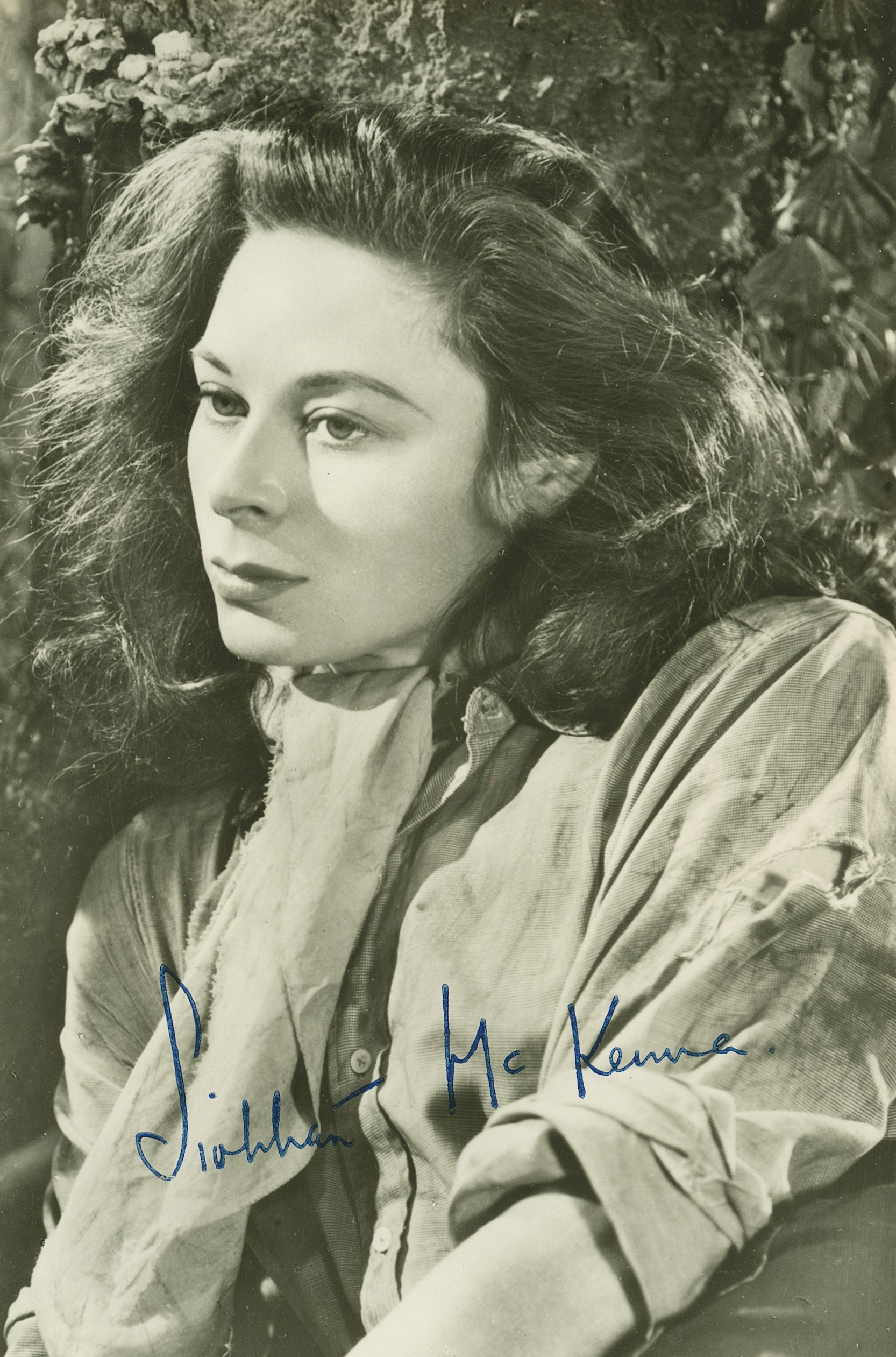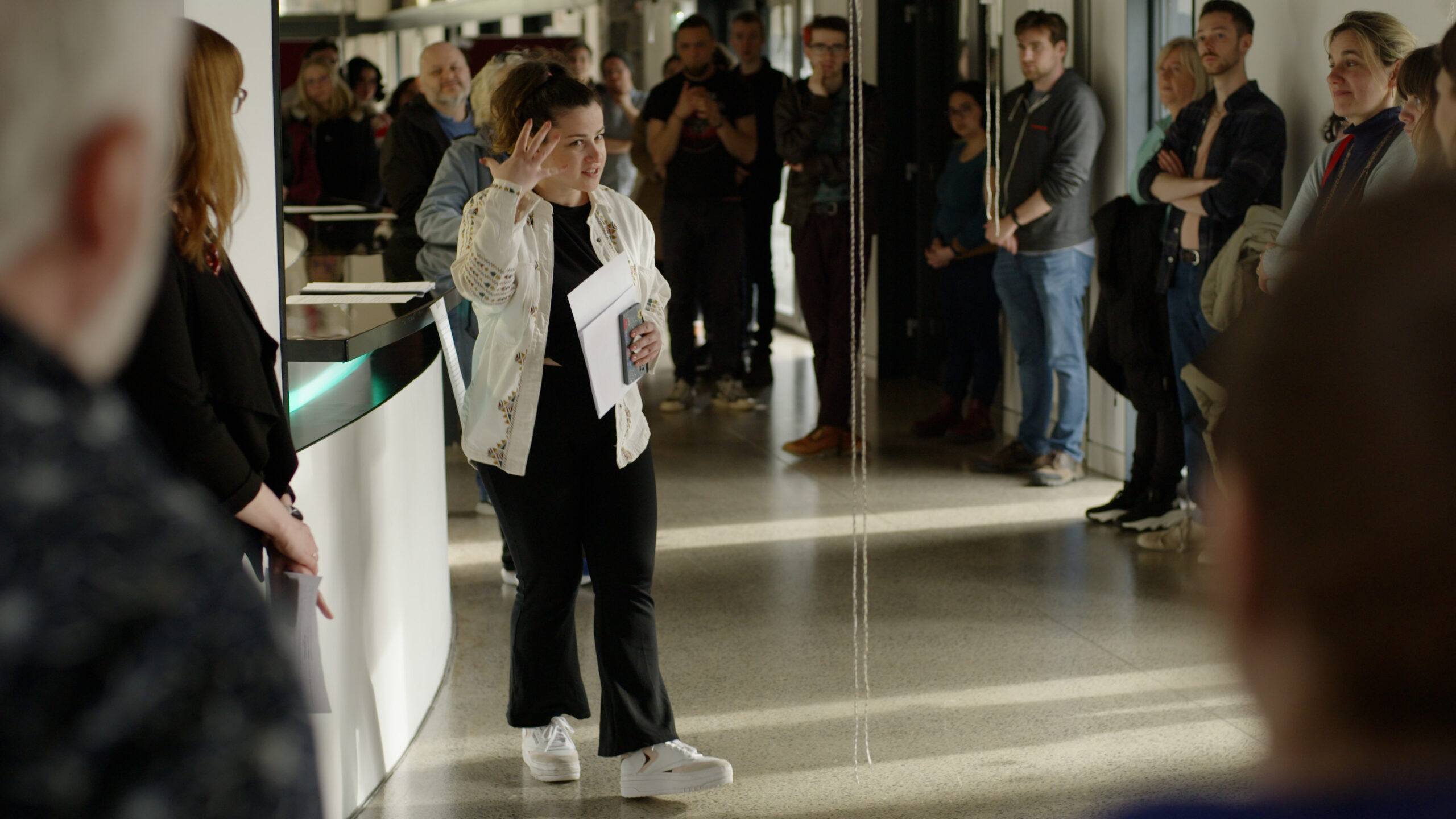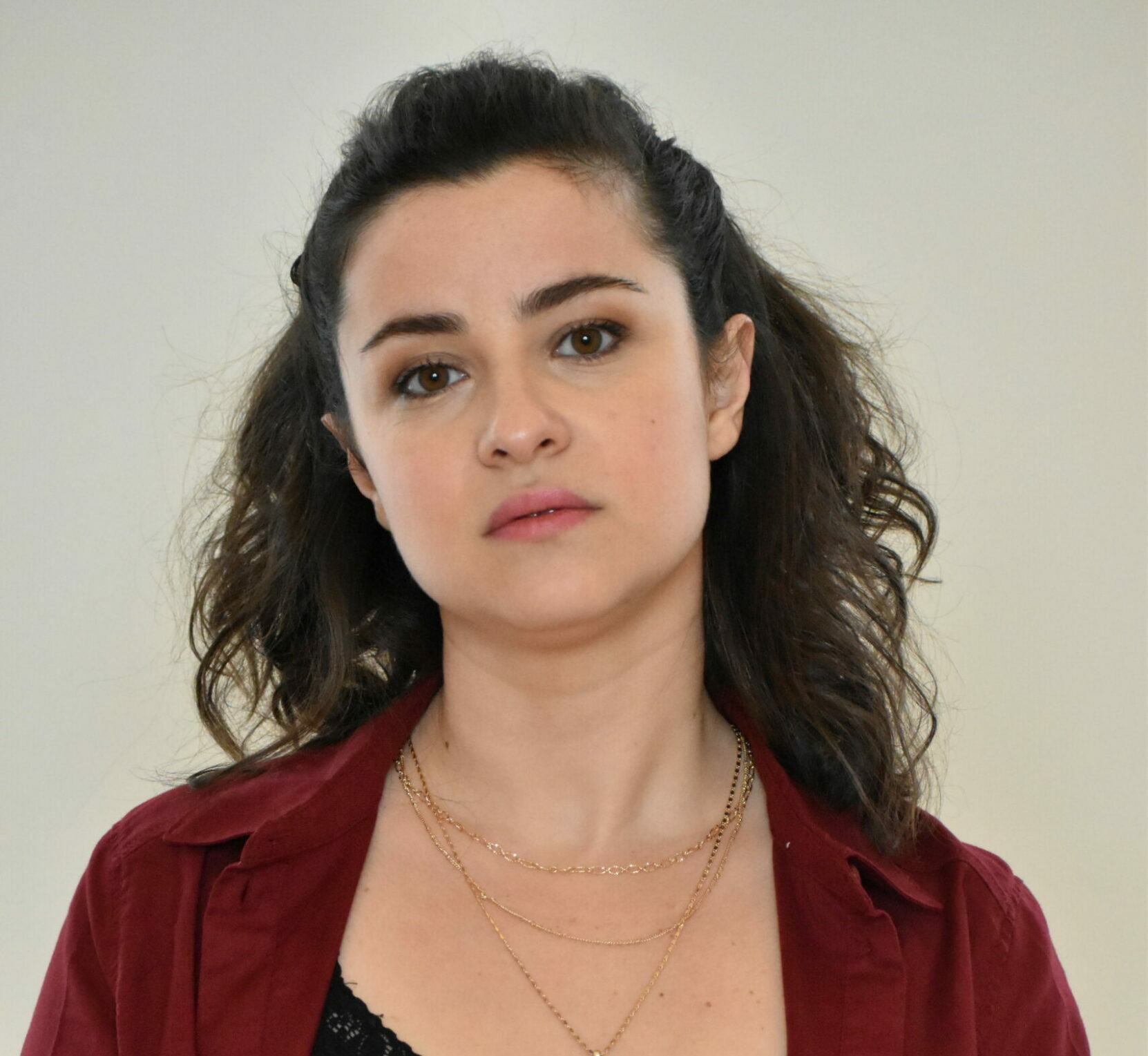
The legacy of the wonderful Siobhán McKenna, actor and University of Galway alumnus, lives on in many ways, not least in the recent theatre award created by her family in her honour.
Its first recipient, multitalented Nouf Rafea, speaks openly about her journey to date, her affinity with languages, and her fellow feeling with Siobhán McKenna as a theatremaker, linguist and activist.

Siobhán McKenna remains one of Irish theatre and film’s most recognisable and iconic faces globally, even as her own beginnings root her firmly in the west of Ireland and at the University of Galway specifically. McKenna’s individual success in the mid-to-late 20th century not only in theatre, but also in film and television internationally, was pivotal in laying the foundation for the ongoing success of 21st-century Irish artists globally.
This is visible through the stratospheric recent success of individual stars, like recent Best Actor Academy Award winner Cillian Murphy, or the presence of multiple Irish novelists crowding out the Booker Prize longlist in 2023 (including University of Galway’s Elaine Feeney), before Limerick author Paul Lynch ultimately took the top prize.
Recognising the ongoing draw of Siobhán McKenna’s star power in driving the future of Irish theatre and arts, both locally and globally, her family recently established the Siobhán McKenna Scholarship Award and Lecture Series to support the next generation of theatremakers at University of Galway in celebration of the 100th anniversary of McKenna’s birth on 24 May, 1922.
This article introduces the first Scholarship Award winner, theatremaker Nouf Rafea. While McKenna would not herself have used the term theatremaker (a more contemporary term which implies that an individual is able to work collaboratively, with mastery of multiple theatrical crafts), it is difficult now not to identify her as such, particularly if we hope to discover the kind of individual who might someday follow in her footsteps through the Scholarship Award for the MA in Drama and Theatre Studies.
McKenna was not only a world-renowned actress of stage and screen but also a theatre director, translator and activist, who served on the Council of State and spoke out on causes such as the battle against apartheid in South Africa. It is difficult to do justice to the range and depth of her legacy both in Ireland and internationally. Much lies yet to be discovered about her contribution to theatre, film and the wider public sphere in the University of Galway’s Siobhán McKenna archive.

An emerging theatremaker today might feel that Siobhán McKenna is an impossible act to follow, even within the university where she gained her very first acting experience through involvement with An Taibhdhearc as a student.
Indeed, the scholarship endowed in her name looks for the successful candidate to provide strong evidence of future potential across a range of skills and types of theatrical engagement including acting, directing, translation, politically engaged arts and/or use of indigenous/native language(s) in the arts. We assumed applicants would excel in a few of these areas, not all of them, as McKenna herself had. However, our inaugural Siobhán McKenna Award winner, Nouf Rafea, immediately proved us wrong. Rafea is not yet the household name that McKenna remains, but we introduce her now and will watch her progress with great interest.

Nouf Rafea is a multifaceted theatremaker currently undertaking the MA in Drama and Theatre Studies at University of Galway as the inaugural Siobhán McKenna Award winner in 2023–2024.
She has worn many hats as a director, theatremaker, producer, educator, writer, performer, scenographer and storyteller, and is an emerging theatre scholar. Originally from Syria, her theatrical journey began in childhood before she pursued a degree in Scenography (the study of all elements of theatre design and staging) from the Higher Institute of Theatrical Arts in Damascus, Syria in 2015. She expanded her horizons through the Theatre in Education programme at the ArtEZ School of the Arts in Arnhem, the Netherlands in 2022. Continuing her artistic trajectory, she pursued the Music Theatre MA course at the same school before coming to Galway in August 2023 to begin her studies. During her time in the Netherlands, Rafea established “Collective Pitjes United” in 2020, amplifying themes of womanhood and oppression on stage: https://www.pitjesunited.nl/.
Rafea’s ultimate mission is to create interdisciplinary theatre work on a global scale moving between Syria, the Netherlands and now Ireland, much like McKenna’s own multi-continent impact and travels. Rafea’s intercultural theatre practices centre women’s experiences, exploring a spectrum from independence to oppression and all experiences in-between, as she takes on diverse roles in her work including performer, director, curator, scenographer and writer depending on the project. Balancing building educational theatre techniques with achieving high artistic quality, Rafea seeks to amplify unheard stories as a way to “unite, laugh, educate and lend a hand”.
In the following section Nouf talks candidly about her journey to where she is today.
I grew up in an artistic family, with music in our genes. When I was four, I started learning to play the violin. I loved music but also loved theatre, weaving stories, drawing, acting and dancing. Art flowed through my veins in a rebellious way, confirming what my father said when I was born: “This girl will be a rebel.” I resisted the path my family envisioned for me, steering away from the purely musical trajectory they had in mind. Though I adored creating music, it was the immersive world of theatre that truly spoke to me – a medium through which I could authentically express myself. My rebellious spirit found expression in unconventional ways; I remember defiantly sketching on the walls of my room, a silent protest that eventually led me to pursue studies in Scenography. Yet, even then, I hungered for more. I craved genuine connections with others, a desire to collaborate and create art that resonated deeply with people, addressing societal issues and shattering stereotypes. For me, theatre embodies what Augusto Boal famously described as “a rehearsal for the revolution”.
Regardless of whether the actions unfold within fictional realms, what truly matters is their ability to incite real change. Theatre, to me, is not merely entertainment but a powerful tool for social transformation – a platform where action takes precedence over passivity, where voices are amplified and heard.
I belong to everywhere and nowhere at the same time. I belong to Syria, the Netherlands and Galway at the same time.
Every unheard story is my story, one that I must share, engaging my audience across the vast universe to unite beyond all boundaries set for us, bridging the gap between us as human beings, making it smaller and more reconcilable.
My artistic process always begins with a true story, an unheard real story. That usually determines the theme I’m going to work on. After that, I start to search for puzzle pieces from diverse sources, including literature, history, personal experiences, music, visual art and other theatre works. Collaboration is also a crucial aspect of my process; I thrive on exchanging ideas and perspectives with fellow artists, as it enriches the creative journey. Once I have a solid foundation, I begin to experiment, allowing intuition to guide me as I shape the work through rehearsals, workshops and revisions.
Although my creative process seems well-structured, it is not organised at all. The diverse voices in my head – I call them monkeys – are always at a party, making my life a hellish heaven. That is the bittersweet feeling in the process that I love. Most of the time, my creative process is too chaotic and unstable, like life itself. Believe it or not, the minds of creative people are always in dialogue with different inner voices, and others’ perspectives, responding consciously or unconsciously to actions around them. It takes a long time of practice to understand how the creative process works. In the end, I concluded that all I need is to practise embracing the messiness in the process, loving my “selves”, and listening to the multi-voices in my mind without controlling them to achieve a polyphonic creative process. The chaotic, unstable life and the inner active voices – my monkeys – are the core of my creativity. Firstly as a human being, and then as a theatremaker and artist. I consciously chose to give free space to my beautiful monkeys, to let them be together in an incredible composition to create an authentic theatre work.
Winning this award has been a weighty responsibility that I carry on my shoulders, as the name of Siobhán McKenna must resonate through our time and into the next generations, much like other strong women in history who fought tirelessly for equality and justice. Just envision her courage during an era when women’s voices were often weak, their rights denied, and their lives harsh. Yet, despite these challenges, McKenna fearlessly instigated change, leaving an indelible mark as a female actor, director and activist, asserting her presence in the world of theatre and film.
For me as the inaugural recipient of this scholarship, it serves as affirmation, reminding me that my voice must resound loudly through my work as a theatremaker. We, as women of this era, must carry forward the legacy of those powerful women throughout history, immortalising their journey and struggle, and continuing to pave the way for future generations of women. Through this cumulative effort, we inch closer to a just society.
McKenna’s life inspired me to embody the ethos “let your work speak for itself”. It prompted me to ponder deeply on my aspirations as a theatremaker. Is it for fame? No, as that is merely a byproduct that will naturally follow if the work is done well and consistently. Is it about wealth? Theatre is for those who prioritise simplicity and aren’t driven by the pursuit of riches in this capitalist and materialistic era. What I truly seek are art itself, rights and dignity.
While not all activists are theatremakers, every theatremaker must necessarily be an activist, responding to injustices around them, advocating for human rights, and amplifying the voices of the marginalised for a better life.
When effecting change, we need individuals like Siobhán McKenna, who boldly ask Why? and engage in conversations that can lead to meaningful transformations. Together, we have the power to bring about changes for the next generation.
The perpetual question we must grapple with is: Can a performance or a theatremaker truly change the world? Perhaps not in its entirety, but if every theatremaker believes that their voice cannot enact change, then surely no change can occur. We must all believe that each small step taken has the potential to make a difference. From my perspective, I steadfastly believe that my work can contribute to making the world a better place. In the essence of theatre, where rules are non-existent, we have the power to create our own, and thus, change the world.
While we are all unique, we are not all born with the same capacity. Some among us are braver, less afraid, bearing the weight of the world’s issues on their shoulders. They draw their energy and strength from their anger and rebellion against injustice, poverty and wars. I am grateful for possess this capacity, and I will always advocate for justice through my work, proudly wearing the name of McKenna like a medal on my chest.
Multilingualism plays a significant role in both my artistic and personal life. I speak three languages: Arabic (my mother tongue), English and Dutch, and I am currently learning Spanish. Who knows, maybe Irish will be next. In my childhood, I often dreamed of speaking more than six languages. I am captivated by the idea of expressing myself in different ways through various languages, as it offers insights into how people think through their native tongues.
I speak English and Dutch well, but I do make mistakes. I accept them and use them as theatrical elements in my work as a theatremaker. Moreover, I infuse a sense of poetry from my mother tongue, Arabic, into my expressions in other languages.
As a theatremaker, I strive to shift the concept of theatre from a national to an international form by collaborating with artists from diverse cultural backgrounds and incorporating their native tongues into my plays and performances. Embracing multilingualism allows me to connect with a broader spectrum of audiences and delve into the intricate layers of language and identity within my work.
My primary goal is to secure funds for Collective Pitjes United, which I established in 2020 in Amsterdam. While we’ve received funds for individual projects, formalising the company is essential for sustained support. Pitjes United is a women’s collective of interdisciplinary theatre dedicated to bringing authentic stories of women to the stage. Our mission is global, aiming to amplify oppressed women’s voices worldwide for an equitable future and bring themes of oppression and womanhood onto the stage.
Another aspect I am pursuing is founding an organisation that supports women in starting their own ventures, not only in the arts but also in the other careers that they want; the goal is giving them the tools they need to make their plan, ask for funds, and take the first step. By providing them with the necessary tools to establish their own businesses, I aim to empower them, encourage them, and work alongside them to achieve their goals.
I believe that fostering a healthy generation begins with empowering women. By educating and supporting women, helping them to feel confident and empowered, we lay the foundation for a brighter future. It is through women that we can cultivate a generation that thrives, as they play a pivotal role in shaping families, communities and societies as a whole.
Learn more about the Siobhán McKenna Award and the MA in Drama and Theatre Studies at University of Galway. You can also schedule a visit to the publicly available Siobhán McKenna Archive here.
Click here to view the launch of the Siobhán McKenna Scholarship Award and Lecture Series.
Profiles